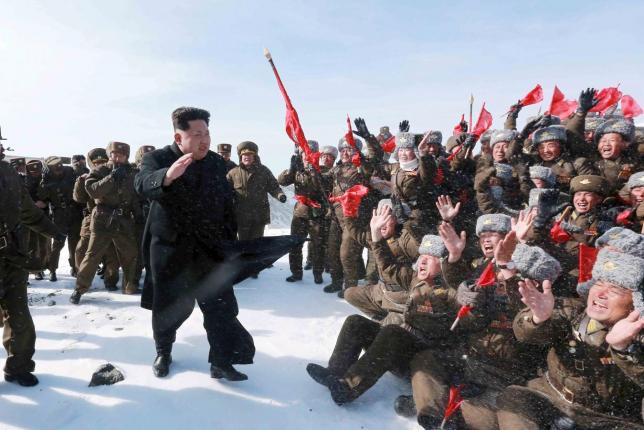Defector reveals life in North Korea, 'the most dangerous place to be a Christian'

Christians in North Korea are forced to worship God in secret as authorities tell people there is no God and order them to praise the state leader instead, a woman who managed to escape the Communist country revealed to CBN News last week.
Kim Eun Jin, 31, who fled North Korea in 2005 and is now residing in Seoul, South Korea, described the persecution of Christians in North Korea, a country described as "the most dangerous place in the world to be a Christian."
Kim said she was born in Pyongyang, the North Korean capital, into a Christian family who had to keep their religious activities under wraps as freedom of religion, although guaranteed under North Korea's constitution, is never encouraged.
"Growing up I was told by the authorities that there was no God in this world," Kim said. "We were ordered instead to worship Kim Il Sung and Kim Jong Il, the leaders of the country."
"We met every Saturday evening," Kim recalled.
"My family gathered in the back room of our small apartment," she said. "We had to be very quiet. We whispered when we prayed, sang songs or read the Bible. We often covered our heads to muffle the noise."
Kim grew up with stories that Pyongyang was once known as the "Jerusalem of the East," with Christians constituting 13 percent of the population in 1945.
According to estimates of the US' Central Intelligence Agency, about 2 percent, or 480,000, of the present 24-million population in North Korea are Christians.
There has been a systematic targeting and persecution of those who keep the Christian faith, but that did not keep believers from worshipping God.
"My parents often asked me to stay outside the apartment on Saturdays to make sure no one was coming while the family prayed inside. We couldn't allow anyone to know what was going on," she said.
Kim recalled that over time, the meetings included a few friends and extended family.
"We had one Bible in the house. My grandmother, who was a believer from the Japanese Imperial times, had a Chinese Bible. She translated the Bible by hand into the Korean language on pieces of paper. That's how we read the Bible. We found strength in those pages."
In 1994, authorities discovered that her father has been operating an underground church. Her father and an uncle were arrested and ended up in one of North Korea's six labour camps.
"My father was a tailor in town and the police suspected something was going on," she said. "We believe they planted listening devices in his shop and on his clothes."
"The day my father was arrested I was at school, but I'll never forget that day. He hugged me before I left for school and like every other day he reminded me to be careful."
"Every morning at the breakfast table he would tell us that one day the government will come and arrest us for being Christians. He warned us of the price we would someday pay for our faith. I remember him saying often that 'Even if I face death I will follow Jesus."
Kim doubts her father is still alive today, saying: "Everyone knows what happens when government agents arrest Christians in North Korea. They never make it out alive."
"I know my father is in Heaven and he's praying for North Korea and my family," she said while in tears.
Of some 200,000 detainees in political prison camps in the country, an estimated 30,000 are Christians.
The regime has been heavily criticised for human rights violations.
"They (North Korean Christians) are treated as criminals, especially as terrorists, and they are prosecuted based on national security crimes of North Korea," said Won Jae-chun, a law professor in South Korea's Handong International Law School.
The organisation Open Doors, which supports Christians with Christian materials, training, and livelihood, has put North Korea at the top of its World Watch List, citing the source of persecution as "dictatorial paranoia."
"North Korea is the most dangerous place in the world to be a Christian. The state has an iron grip on its citizens; any who deviate from the two ideologies of 'Juche,' which points to man's self-sufficiency, and 'Kimilsungism,' the god-like worship of the nation's leading dynasty, are considered enemies of the state," said Open Doors.
"Thousands of Christians are incarcerated in prison camps in North Korea, and while there are many secret believers, they face arrest, disappearance, torture, or public execution if discovered. Yet the church there is not only surviving, but growing."
Kim finally crossed the Tumen River in 2005 and defected to China with the help of a Chinese pastor. Her family followed months after.
"It was a difficult decision. I knew that if I got caught I'd be arrested and sent to a prison camp," she said. "But my family defected because we were being persecuted in North Korea for our faith."
Now, Kim has formed her own family and lives in Seoul, South Korea.
"I am very proud of what she did. Her family has gone through a lot over the years. She is a hero in my eyes," said Jeong Hyung Shin, Kim's spouse.
Kim instead credited the man who laid down his life.
"I grew up in a land where they said there was no God. But my father told me otherwise. He loved Christ and for that he died," she said.
Kim dreams of returning to Pyongyang someday and spread the Christian Gospel of love to other North Koreans.
"We are getting ready for that day when the doors open," Kim said.











